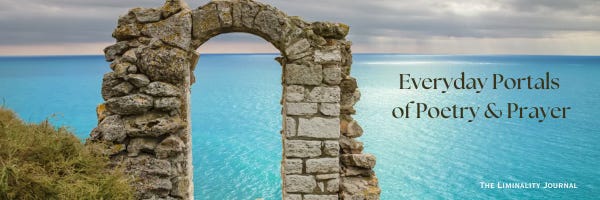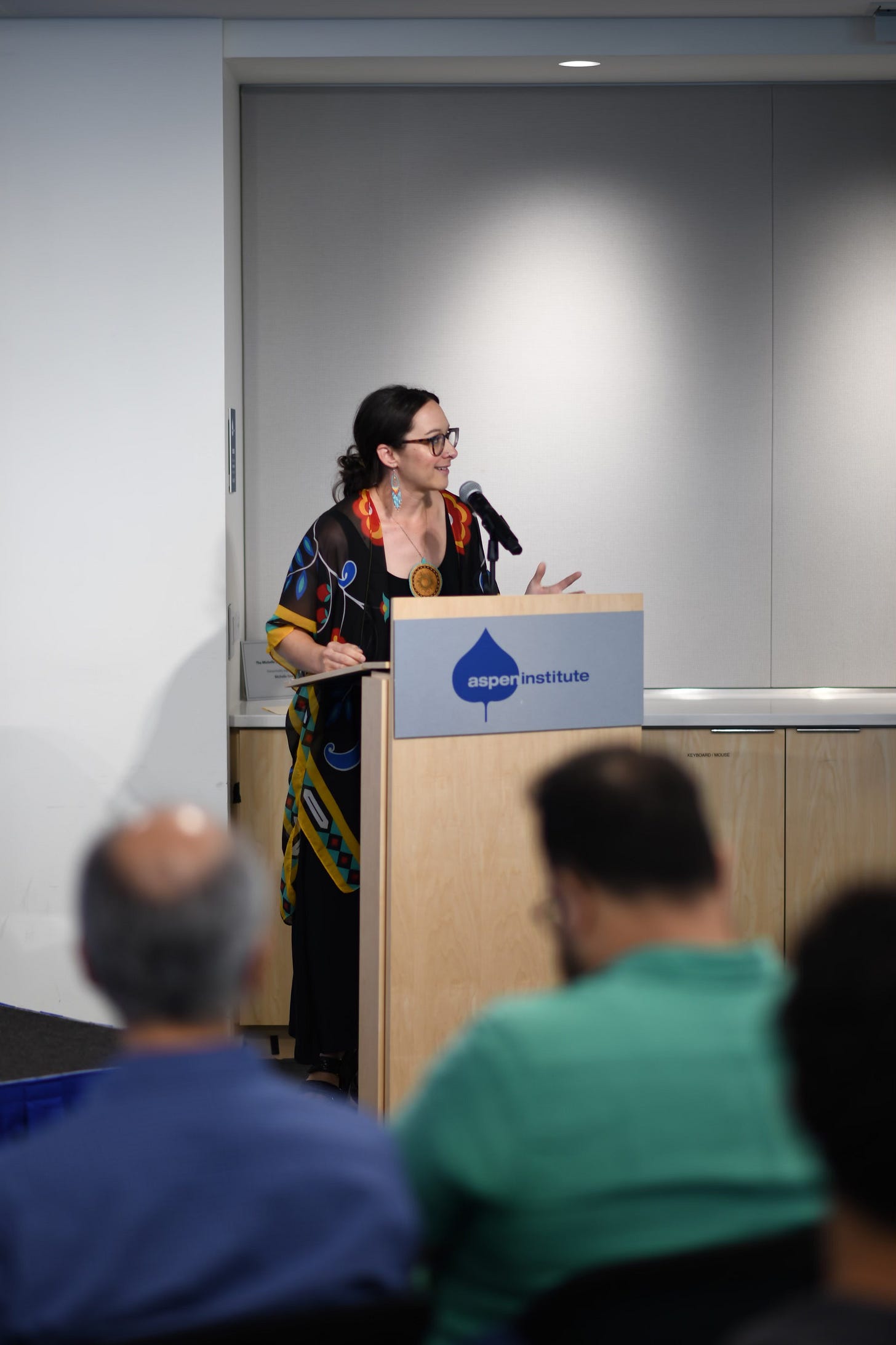
Friends,
I confess, I am feeling some resistance (pun intended, I guess!) to writing about prayer right now, to leaning into this series about portals and prayer and poetry. But I think that probably means that I should lean in.
I don’t want to write to you about Trump from now until he becomes President; what I want is to be present to what we have before us, in this moment, to stay held and tethered to The Sacred in our lives, both as individuals and as community, so that when the days get harder, we know how to hold it all—together.
Portals to the Sacred are truly everywhere, aren’t they? And we have the option to choose, right here, in this moment, or in the hard moments that come later, or when we are afraid, to:
stop and breathe
to enter into a deeper connection with our own souls
to let the gift of sacredness wash over and hold us
and to commit to letting it last in our daily life
This week we are focusing on this question: are we harmed by prayer or by institutions?
This is a big question, and I think one I’ve been asking for a long time.
As many of you know, I grew up in the Southern Baptist church, spent a few years in a non-demonational charismatic space, a little bit of time in a progressive Baptist church, and an even shorter time in an Anglican-Evanglical mashup (yes, it was strange). Now, I’m not part of an institutional space.
So I’ve been asking for years what it means to pray.
I know I’m not alone in my meandering journey; I know the experiences of the “nones” have become louder and clearer in America, as well as in other nations; people are leaving behind institutional religion or just spaces (specifically Christian ones) to find something different in the world.
I’m re-reading this book that I bought years ago called Gratefulness, The Heart of Prayer by Brother David Steindl-Rast. He has a chapter on prayer, and distinguishes between “prayers” and “prayer” by saying that
Sooner or later we discover that prayers are not always prayer. That is a pity. But the other half of that insight is that prayer often happens without any prayers. And that should cheer us up.
Brother David seems to be helping us distinguish between two different embodiments of prayer, perhaps the more institutionalized embodiment of “prayers” with a congregation and the everyday moments of “prayer” that embed us in the Sacred continually.
This was really helpful for me, because when I was younger in the southern Baptist church, I struggled so much between my personal prayer life and the institutional one—I was told to pray a certain way, at certain times, but that showed up in me as a legalistic mess of a framework that I’ve had to slowly break out of. I’ve had to find my way back to this sort of childlike way of praying and leaning into the Sacred, to come home to myself, to who I am as a Potawatomi woman, to integrate all of myself in the ways I embody prayer.
From my book Living Resistance:
Throughout my childhood and adult life, I have found myself at times, especially out on walks, wondering how Creator or the Great Mystery or the Sacred, is doing. In a moment of what I can only describe as protective empathy, I ask Creator-- how are you doing—really? because I cannot know what it’s like to be aware of what goes on everywhere, all the time. I cannot imagine what it’s like to hold galaxies of grief and joy, passion and exhaustion. I cannot imagine what it might be like to be the essence of the Beginning and to constantly hold time, whatever time is. So I ask, How are you doing with all this? And I wait for answers in the wind, at the treetops when I look up. Asking God, Mamogosnan (Creator), or the Divine how they are seems natural to me. And it simply makes me think about what prayer is…
Prayer was crawling on my knees up to a god who stood towering over me with a look of disappointment, the militant-type narcissistic father who knew I could never be good enough but thought he’d try to love me anyway. This is not prayer.
Embodying prayer as a practice, as a way home, leads us home. Rabbi Danya Ruttenberg writes that prayer “isn’t about the easy and sweet . . . but rather encompasses the anger and the frustration and the ambivalence.”
So it goes with prayer, an embodiment of everything that we are, rejecting the boxes that are created from the toxic status quo of colonization, patriarchy, and hate. Instead, we breathe resistance in and out and realize it was prayer the whole time.
So, back to this question: are we harmed by prayer or by institutions?
Gathering with others and holding our hearts out to the Universe together is incredibly sacred; it’s always been part of who we are as human beings. We seek meaning, we ask for help, we love one another, we dive deeper into what it means to be human.
But when we set rules and guardrails around that, it can become dangerous for our spiritual lives, for our tender hearts, especially as we grow up. It can become a sort of checklist, or empty actions meant to look like something deeper.

Prayer is already complex; are we only asking for what we want? Are we being disappointed again and again by a god that doesn’t seem to be hearing us? Are we making the same mistakes in our own lives and wondering how to hold it all?
Again, Brother David has something to say that helps us hold it all, all the liminality and complexity:
Paradox boggles the mind. But the heart thrives on paradox. We said that to speak of the heart is to speak of fullness. But only paradox can hold that fullness. The child in us understands this. For the child, too, thrives on paradox.
Paradox is that sort of mind-explosion, holding things that don’t seem to want to be held together in our minds and hearts. But our hearts can hold it. They can hold the complexity, like the child in us can hold it. That gives me great hope for what it means to pray.
What I’ve come to understand and what I offer to you is that when we leave behind the toxicity of only being allowed to pray a certain way, we find an expansive universe that holds us, and this happens in 3 ways:
through connection to Mother Earth
through reciprocity with the Sacred
through childlikeness
Prayer is connection with Mother Earth, and that connection brings us healing.
Prayer is reciprocity with the Sacred—giving and receiving love and care in a heavy and weary world.
Prayer is becoming childlike again, living in awe and wonderment, opening our hearts to the Sacred in and around us.
We live in a toxic, damaging, oppressive, hurting world full of institutions that often harm us, that are often founded in the name of religion and faith.
We must hold the pain of the wounded world while also holding the tenderness of what prayer is—a constant, threaded, gorgeous, tender yet fierce connection to our own spiritual fires and the fire that burns through everything in and around us.
Onward, friends.
Goodreads is giving away 15 copies of Winter’s Gifts! Please enter to win, the giveaway is over on November 25th!
And if you can, please leave a review for Winter’s Gifts on Amazon or Goodreads. It always helps to have a good and kind word out there, and is especially special during Native American Heritage Month.
And lastly, I’m booking events for 2025. I’m telling you this now because, as my community, I hope that you’ll dream ahead with me. I kind of hate it when books I’ve written become relevant to the time we are living in—but if they didn’t I guess I wouldn’t be a writer, would I?
In 2025 I want to help others hold space for what it means to resist, to practice care, to dream and imagine, to stay tethered to ourselves, each other, and the earth.
If you know of any spaces that might like to host me for a keynote or a retreat, please let me know! You can contact me through my website. Thank you!






I love this final line: "We must hold the pain of the wounded world while also holding the tenderness of what prayer is—a constant, threaded, gorgeous, tender yet fierce connection to our own spiritual fires and the fire that burns through everything in and around us."
Or? Why are questions often asked as an “or” as if we are trapped into this cosmic consciousness of duality? Maybe harmed by both or neither.